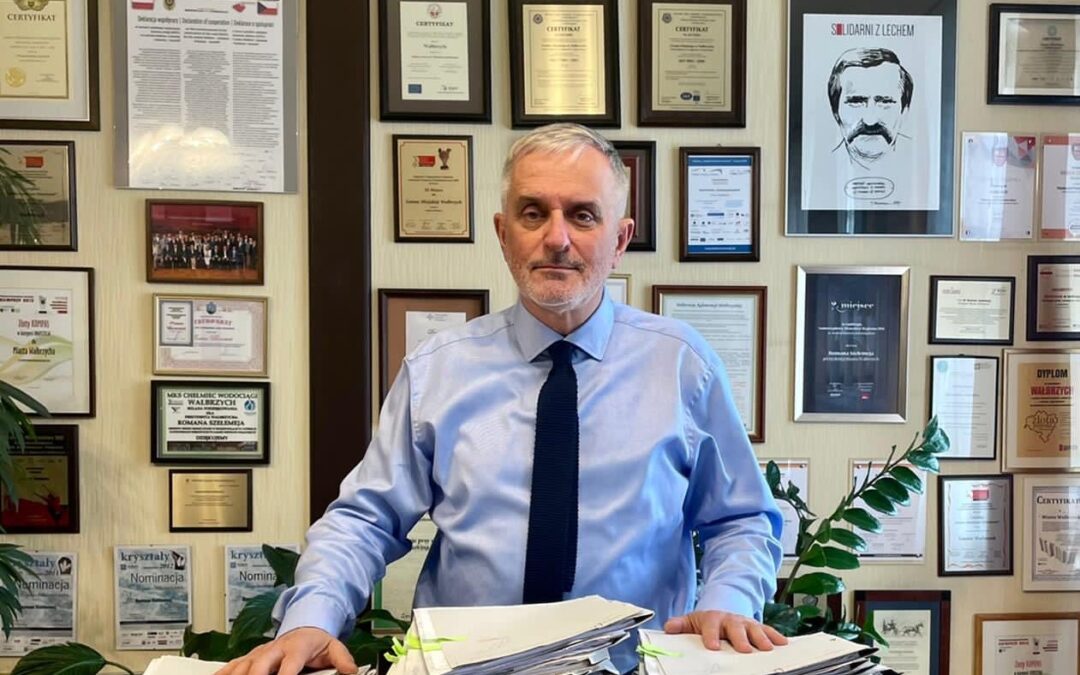The mayor of Wałbrzych, a city that recently moved to make coronavirus vaccines compulsory, has been given police protection after receiving death threats and having his social media channels filled with offensive and critical comments. Around 200 people also took part in a protest in front of his house.
Roman Szełemej was the driving force behind a resolution requiring all those living and working in the city to be vaccinated. It was voted through by the council last week, though it must still be approved by the provincial governor before entering into force. The mayor also appealed for vaccination to be made compulsory nationally.
The resolution “triggered massive attacks of hatred and aggression,” Szełemej’s spokesman, Edward Szewczak, told Onet. The mayor has been labelled “Doctor Mengele” and “a fascist” by critics, and has received death threats via social media messages.
Szełemej, who is himself a medical doctor, admitted that he was aware that the resolution might stir controversy, but had not anticipated such a violent reaction. While the mayor welcomed constructive criticism, “this has gone too far”, added Szewczak.
Police have been notified and sent screenshots of the offending comments and emails. As a result, the mayor has received police protection and his Facebook profile was temporarily suspended. Two years ago, another mayor – Paweł Adamowicz of Gdańsk – was killed by a man with an apparent grudge against the Civic Platform party that Szełemej also represents.
On Monday, a protest by around 200 opponents of the resolution was staged in front of the mayor’s house. “How can you introduce obligatory vaccination against coronavirus, which might not even exist? It’s a load of rubbish,” one demonstrator said.
A decision on the resolution is now in the hands of the provincial governor, Jarosław Obremski, who has 30 days to decide whether to uphold it. However, he and his deputy have already expressed doubts over the measure.
“Such legal acts, although stemming from noble intentions as we know that we all should get a jab, in my opinion belong to the competences of the central authorities,” said Grzegorz Macko, the provincial deputy governor.
“You can achieve more in Poland by persuasion rather than pressure,” said Obremski himself, adding that the city council might have overstepped its brief.
Szełemej admitted that, “under the current state of law”, the resolution does not carry any practical consequences, such as termination of contracts, for those who opt against vaccination.
He also stressed that in the justification for the resolution, the council focused on various incentives and bonuses for those who take the jab, as well as on educational efforts that would make any penalisation redundant.
The mayor of another city, Białystok, has also called for a national policy to provide more encouragement for people to get vaccinated, suggesting that people who have been inoculated could be allowed to go to restaurants, cinemas or theatres or stay in hotels without any limits.
Ponieważ szczepienia stały się powszechnie dostępne apeluję do @MorawieckiM @a_niedzielski @michaldworczyk aby wprowadzić dodatkowe zachęty do szczepień np. osoby zaszczepione mogą chodzić do restauracji czy też bez ograniczeń korzystać z hoteli, kin, teatrów itp
— Tadeusz Truskolaski (@TTruskolaski) May 6, 2021
“Since vaccines are easily available, I appeal to Mateusz Morawiecki, the prime minister, Adam Niedzielski, the health minister, and Michał Dworczyk, [who is] responsible for vaccine rollout, to introduce special incentives for vaccination,” Tadeusz Truskolaski wrote on Twitter.
The Polish coronavirus vaccination rollout is continuing to accelerate. This morning, the country reported its highest daily total of jabs to date, exceeding 400,000. The total number of vaccinations administered is more than 13 million, and 9.7 million people have received at least one dose.
Yesterday, as the government published further details of the rolling back of coronavirus restrictions, it revealed that people who have been fully vaccinated will not count towards the limit of attendees in the case of indoor and outdoor events.
Main image credit: RomanSzelemej/Twitter

Agnieszka Wądołowska is deputy editor-in-chief of Notes from Poland. She is a member of the European Press Prize’s preparatory committee. She was 2022 Fellow at the Entrepreneurial Journalism Creators Program at City University of New York. In 2024, she graduated from the Advanced Leadership Programme for Top Talents at the Center for Leadership. She has previously contributed to Gazeta Wyborcza, Wysokie Obcasy and Duży Format.




















